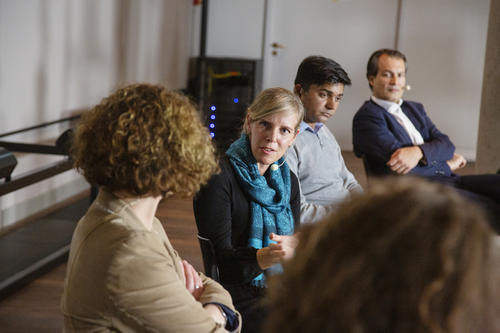"How (not) to increase Vaccination Willingness" at the Berlin Science Week 2021
Nov 10, 2021
The panel discussion on policy measures to increase vaccination willingness and research on hesitancy was hosted by SCRIPTS in cooperation with the Humboldt Lab of Humboldt-Universität zu Berlin. Three researchers from the field of economic behavioural research and international health governance, and a public policy expert from the German Federal Foreign Office, were part of the conversation. The event took place at the Humboldt Lab as part of the Berlin Science Week on Monday, 08 Nov 2021.
Speakers
- Prof. Heike Klüver (Principal Investigator at SCRIPTS and Professor of Comparative Political Behaviour at the Humboldt-Universität zu Berlin)
- Dr. Katrin Schmelz (Postdoctoral Researcher at the Cluster of Excellence “Politics of Inequality”, Universität Konstanz)
- Prof. Mujaheed Shaikh (Professor of Health Governance, Hertie School)
- Dr. Katrin Schmelz (Postdoctoral Researcher at the Cluster of Excellence "Politics of Inequality", Universität Konstanz)
- Dr. Martin Bergfelder (Head of the Department “Globale Gesundheitsfragen” and Head of Corona Taskforce, Federal Foreign Office Germany),
- Moderation: Julia Vismann (science journalist and moderator, rbb, radioeins)
Summary
The topic of the event initiated by SCRIPTS and implemented in cooperation with the Humboldt Laboratory of Humboldt University picked up on a highly topical debate: On the day of the event, the RKI reported the highest incidence rate so far since your beginning of the COVID-19 pandemic. Widespread vaccination coverage is to date considered as one of the most important tools to contain the spread of the virus by both researchers and the government.
The key questions of the panel were: What strategies can governments and public administration as a whole pursue to increase vaccination coverage? What is the relationship between vaccination decisions and citizen trust in government institutions — in Germany and in other countries such as India? What are the key lessons for international public health actors and society as a whole?
The discussion began with an insight into the latest research findings by Heike Klüver, Katrin Schmelz and Mujaheed Shaikh. Their different studies (mainly quantitative surveys) showed and confirmed again that trust in public institutions is the decisive factor for the willingness to vaccinate and in general for the willingness of citizens to cooperate with the state. Martin Bergfelder then highlighted the challenges faced by the German government in distributing vaccines and the urgent need for medical supplies in general during the pandemic.
In the discussion, the participants identified the following points as the basis for building sustainable citizen trust:
- Open and constant communication on the part of science and government with citizens,
- “proof points” - i.e. confirmation and evidence of the promises made by the government,
- recognisable stringency and consistency of the measures taken by public institutions, as well as
- effective instruments of citizen participation and
- closely networked international structures.
The recorded livestream of this conversation can be watched here: https://www.youtube.com/watch?v=lxxWlMiTcVg

